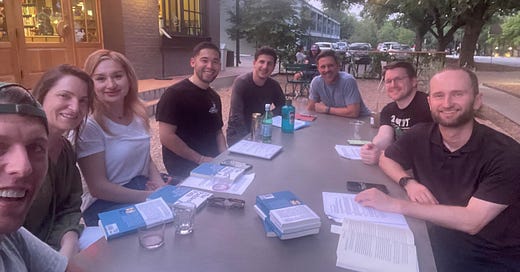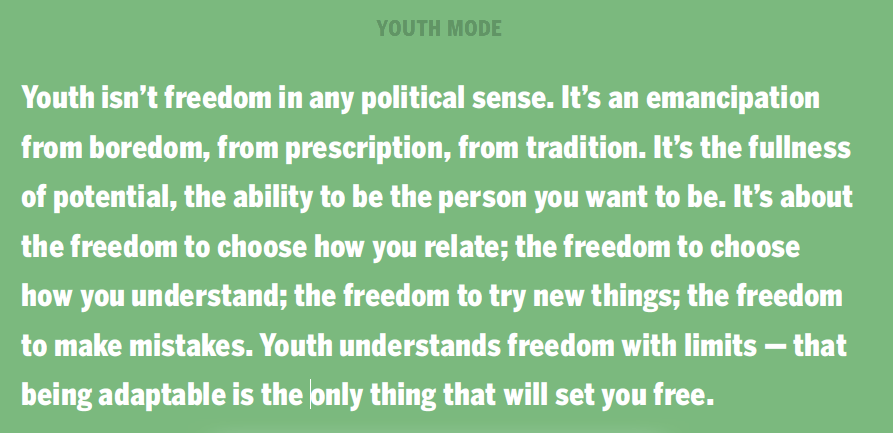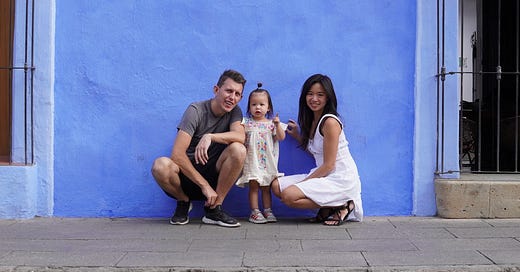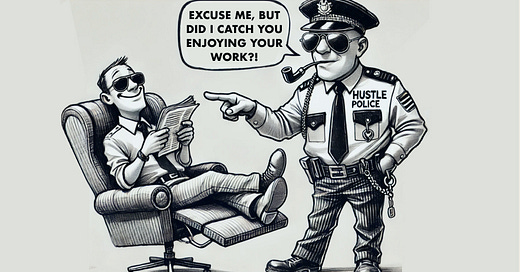May 12, 2024: Greetings from Austin. I took a couple of weeks off from the newsletter because I haven’t been doing anything except writing and editing my draft of my upcoming book, Good Work (hopefully will get a pre-launch page up soon). This week is a collection of pathless-y reads I stumbled upon over the last few weeks.
+ Sabbaticals: A friend, Cecile Marion just launched a course, Thinking of a Sabbatical, to help people think about taking a break from work. I wrote a bit about that below too but if you are interested in the course, it’s $150. It’s better than anything I could create but I did record a couple of videos for her. Check that out here (not an affiliate link).
+ Home Swapping: We’ll likely be using Kindred a bit this summer. It’s a pretty cool home-swapping alternative to Airbnb. If you want to join, use my signup code.
+ Book Club Thanks: Thanks to Ryan Mcintyre who invited me out to this book club in Austin for my book. It was the first thing I’ve ever done like this which was a bit scary (“what will they say?!”) but ultimately went well. I loved hearing people’s diverse perspectives on work. If anyone wants to fly me on their private jet to their book clubs around the world, I am available. Inquire within.
#1 Sabbaticals & Breaks
I seem to be an attractor for people taking breaks from work and don’t tire of people’s reflections. Here is
, who graciously let me use his apartment as a podcast studio before we even met in Spain, on pausing after leaving his recent job:It’s about creating time and space to focus on those areas of life we tend to de-prioritize when we’re working full-time. It’s a time to reflect and develop new skills. I’m still “working” - but I’m working on joyful pursuits. I’m not stressing over Slack messages or jumping on client Zoom meetings.
It’s only been a couple of weeks and it already feels rejuvenating to have some flexibility to learn new skills and explore the things I love doing.
I’m not worried about getting new clients or finding another job. Employers these days know that humans are not robots and the good ones will even give praise for having enough EQ to give yourself a break.
I suspect that we’ll look back on continuous employment throughout adulthood as a temporary phenomenon of industrialization. In a world where more work is creative, abstract, and specialized, I think the “break” from work will become far more common (if not expected).
In my current book where I’m writing about the idea of finding “Good Work,” I am talking about how breaks and sabbaticals are often a vital step in eventually finding the work. The reason they are so powerful is that they allow people to have a different relationship with doing any kind of work, paid or unpaid. Without the pressure to do stuff for a job, people are surprised to find their intrinsic motivation, the kind that once powered them to follow childhood fascinations and interests.
Here is what a friend, Cécile Marion, wrote about hers about eight months in:
Just as I had started to write, I also got curious about design and web design - I spent more hours than I probably should have on learning how to use figma, squarespace and webflow well such that I could create a website that felt like me and illustrate my writing to make it more appealing. I got curious about neuroscience and spent hours distilling podcast teachings into visual summaries which I then shared on Twitter. I started reading classic books, old and new, and posting commentaries of the ones that resonated most - some short, some detailed..
…
All this made me realise just how many opportunities for meaningful work would come up if I simply followed my curiosity, created things as I explored, and shared some of those with the world.
It’s fascinating reading these accounts to me. This kind of energy is often what emerges before people end up finding the work they can commit to. Sometimes it takes months and sometimes years to find the “thing.” But what often happens (or at least was to me when I was dabbling on side projects before quitting) is that you experience a FAR BETTER relationship to a sort of work than your day job and you become committed to finding that and making it your whole work life. In Cécile’s case, she returned to work for an entire year, trying to make it work on a four-day workweek, before leaving again. This time she hopes for good, to find her weird path and hopefully, good work.
+ She’s also just released a short course on people contemplating taking a sabbatical. It’s far better than anything I could create, so you can check that out here.
#2 Minimize Regrets
In my book (about to hit 50k!) I talk about our two “selves,” the “ought-to” self and the ideal self. The ought-to self is the one that keeps the trains running on time and responds to challenges. By my mid-30s I had an over-developed ought-to self. I ran a tight ship. But I was doing nothing to think about or move towards an ideal self. I was coasting and purposeless.
Since changing course, it has made me realize how there are paths where I would have kept going a lot longer. And that scares me.
This interview with someone in the corporate world for 25 years was fascinating. Mostly because he seems to admit he wishes he made other choices. The whole interview is worth reading but these two parts jumped out:
What dreams does your corporate gig hold back? What would it take to attain them?
This is an important thing for young adults to think about. What do you want to do? Don't “settle down and get a job to save up for those big adventures to do later” because you might get to too old to do them.
Life is about choosing your opportunities. Each choice we make acts to open up new opportunities and simply removes others from the table. Now in my fifth decade, I realize that there are numerous mountaineering experiences I will not have—there is insufficient time and money available due to the choices I've made.
I think this is an interesting point about choices and opportunity. In many cases, people can make drastic changes but more practically there is a wind-down period of years to really get things in order and shift into a new life phase. When younger, I sense that we tend to be overly optimistic about what money might afford us later in life and tend to overlook that our general energy and capacity for change will decline with age. I’m noticing that as I’m about to hit 40 next year and with kids in the mix for at least the next 18 years, my capacity for change will certainly be limited.
I found this comparison of him and his friend interesting too:
What would you tell someone considering a corporate job now?
I have a friend who is a very successful business owner. We started college together and he transferred after our sophomore year to obtain a specific degree at another college. It struck me at the time as rigid; I was living a fluid life of being present to the moment, happily drifting in a world of ideas and parties. But my friend was deliberate and decisive; he thought about what he wanted and did the research to figure out the best course to get it.
My career development has happened more organically, like how a tree grows, and that's a pretty metaphor but I don't think it works well for fulfillment. I think people need to think deeply about what experiences they want from life, what they want their everyday to be, what they want vacations to be, and milestones, what they want to do by 30, 40, etc. Then, prioritize those things. Figure out what you need to do to attain those visions—because what you have are goals and a goal without a plan is just a dream. Dreams go unrealized unless there is a plan, followed by actions to complete it.
Getting what you want out of life or embracing an unconventional path does take a lot of work. We can overlook this early in life too because succeeding on the default path ALSO takes a lot of activation energy. Just think about the things you did to break into your first or second jobs. A lot right?
That’s the energy you need to make big life changes and if you aren’t going to do that, you need to be making small changes all the time.
If anyone in a similar situation would want to share with my newsletter too, I’d be happy to share the experience.
#3 Youth Mode
I enjoyed this report which I likely viewed years ago but have no recollection. It’s called “Youth Mode." It is a creative PDF that has me thinking about doing something similar for “Pathless”
Read the report here and email me if you’re interested in collaborating on something like this for Pathless, I think it would be fun.
#4 Elite School Districts
reflects on having his son in one of the top school districts in DC:The more I observed the kids in their respective schools, the more I realized that the schools had less to do with their upbringing than the larger environment, the culture that is the DMV—and there was no escaping that culture.
There was no amount of lectures I could ever give to my son to explain the wealth and privilege he was surrounded by on a daily basis.
No amount of lectures would make him understand why people purchased $1.6 million homes and sacrificed their financial freedom to $6,000/month mortgage payments for the next 30 years, or why he doesn’t need a PlayStation 5, or why they would continue to sacrifice their best years spending part of every day stuck in Beltway traffic.
There was nothing I could do about the fact that his friends all lived in gigantic homes, their parents driving Teslas, most of them getting $999 iPhones or iPads for their 12th birthdays (which could get replaced in a heartbeat if the kid broke it). I could never quite explain why I was so satisfied with my 2011 Honda Fit, or why I would never buy one of these homes, even with all the wealth in the world.
There was also no escaping the endless string of parentally supervised activity: the string lessons, the sports practices, the games on the weekends, the parents driving their kids from one suburb to the next in their Jeep Gladiators with Rubicon trim.
There was no escaping the conformity of it all, the feeling that this way is the right way. Even if we’d wanted to parent differently, it would’ve been next to impossible.
I generally hope to avoid this stuff in the US but increasingly, it does seem hard to split the middle between opting into good school districts and avoiding getting sucked into the parenting rat race. Russell’s writing is great generally and I suggest you subscribe:
#5 War Rooms & Peace Rooms
Great reflection on the purpose of spaces on the Internet from
. This is sort of what I’ve realized I’m trying to do (and seems to be working so far) with the Pathless Path community (link below):A cozyweb peace room is characterized by shared behavioral norms, weak and variable gatekeeping (usually assets-based rather than perimeter-based), shallower, less-tested trust relationships, and activities designed to build up peaceful social capital stores. The most extreme and clear peace rooms are pure cultural production zones devoted to art, study, or “deep work” that are radically open to drive-by and permissionless participation. Often they only have security-by-obscurity. The internet of beefs doesn’t leak in much not because there are impenetrable high walls but because the people inside simply aren’t interested in being in fight-mode all the time, regardless of causes. Peace rooms are not good recruitment zones for warmakers. Peace rooms are low-to-medium energy places that try to keep spikes and surges of energy to a minimum, and instead focus on fostering a culture where people simply show up, week after week and as much as they can.
Here’s a bunch of stuff about this newsletter
I am not sure how you ended up here but might have stumbled upon me through my writing or podcasting on our relationship to work, a topic that has interested me for years.
If you don’t enjoy the writing, I strongly encourage you to unsubscribe below. There’s so much good stuff on the internet!! A reminder: I don’t check unsubscribe alerts and never look at my subscriber list. So if you feel like unsubscribing, you can do so below.
But if you do want to stick around:
If you’d like to meet others on “pathless paths”, you can join The Pathless Path Community
Buy or listen to my book, The Pathless Path. If you’d like to do a bulk order you can do that here for a discount.
You can buy pathless path swag like a hat or shirt here
Subscribe to my podcast and leave a review.
Home Swapping: We’ll likely be using Kindred a bit this summer. It’s a pretty cool home-swapping alternative to Airbnb. If you want to join, use my signup code.
Affiliates: In addition, I recommend all of the following services: Ali Abdaal’s YouTube Course, Collective for setting up an S-Corp in the US (recommended >$60k revenue), Riverside.fm for HD podcasting, Descript for text-based video editing, Transistor for podcast hosting, Podia or Teachable for courses, Skystra for WordPress Hosting, and Circle for running a community.
Submissions: Want to share your journey with my audience? I accept drafts for submission.





















"Life is about choosing your opportunities. Each choice we make acts to open up new opportunities and simply removes others from the table."
This has been on my mind for days now. Thank you for sharing this interview and these ideas. Your work is making a difference.
Keep on fighting the good fight!
Thanks for the shout out Paul!